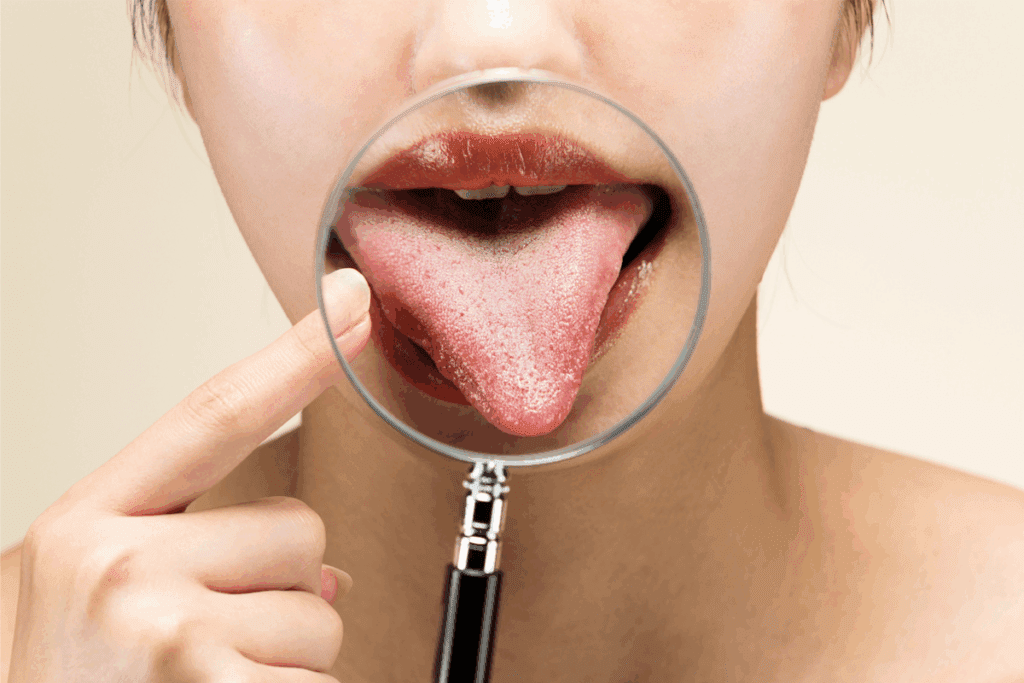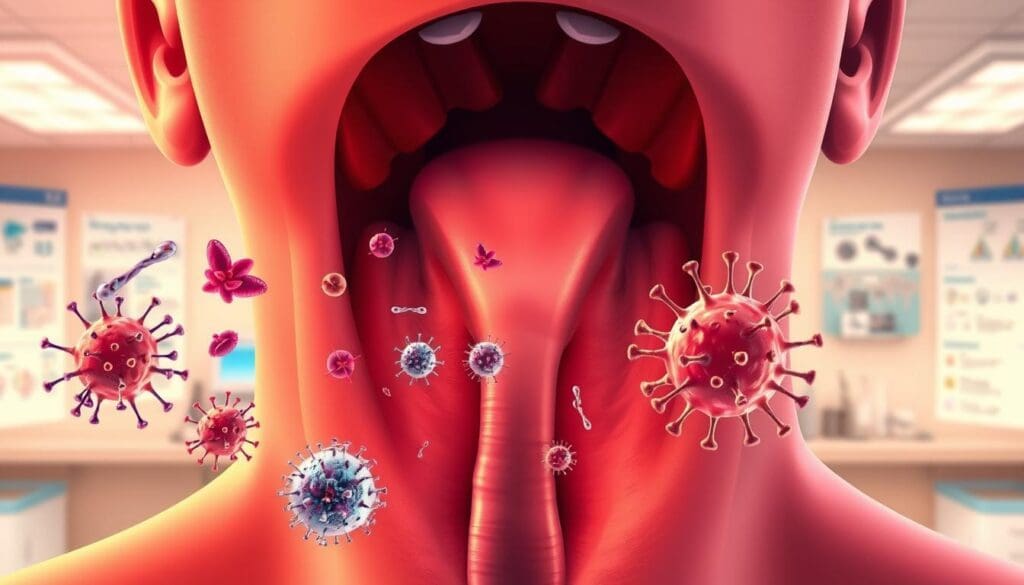Last Updated on October 31, 2025 by Saadet Demir

A complete guide to acute pharyngitis treatment, including pain management, home remedies, and when to seek antibiotics.
Acute pharyngitis, also known as sore throat, is a common problem. It affects many people’s daily lives. It’s one of the top reasons people go to the doctor worldwide.
Most sore throats get better in 7 to 10 days. But, it’s important to manage it well and teach others about it. This helps avoid serious problems and stops it from spreading. We’ll show you how to diagnose and treat it, so you get the best care.
The demand for treating pharyngitis is increasing. This shows we need better ways to care for it. We aim to provide top-notch healthcare and support to everyone.

Acute pharyngitis is when the pharynx gets inflamed. This can happen from infections or irritants. It causes symptoms like a sore throat, fever, and discomfort. These symptoms can really affect someone’s life.
Acute pharyngitis starts suddenly and affects the pharyngeal mucosa. People often feel a sore throat that’s quite bad. They might also have fever, headache, and feel really unwell. The symptoms can change based on the cause, like a virus or bacteria.
Acute pharyngitis is common worldwide and affects people of all ages. It’s a top reason for doctor visits. The cost to treat it and the lost work time add up, making it a big economic issue.
Epidemiological Aspect | Description | Impact |
Prevalence | Acute pharyngitis affects a significant portion of the population annually. | High prevalence contributes to substantial healthcare costs. |
Economic Burden | The condition results in considerable expenses for healthcare systems and individuals. | Increased costs due to diagnostic tests, treatments, and lost workdays. |
Demographic Impact | Affects individuals across all age groups, with varying severity. | Impacts productivity and quality of life across different demographics. |
It’s important to know about acute pharyngitis to find better ways to manage it. This can help lessen its impact on healthcare systems.

Acute pharyngitis can come from viruses, bacteria, or other non-infectious factors. Each cause has its own treatment needs. Knowing the causes helps in finding the right treatment.
Viruses are the main cause of acute pharyngitis, making up about 80% of cases. The top viruses include:
These viruses usually get better on their own. But, taking steps to feel better can help.
Bacteria cause 15-20% of acute pharyngitis cases. The main bacteria is Group A Streptococcus (GAS), or Streptococcus pyogenes. GAS pharyngitis needs antibiotics to avoid serious problems like rheumatic fever.
Other bacteria that can cause pharyngitis include:
Non-infectious factors can also lead to acute pharyngitis. These include:
To deal with these causes, avoid the irritant or manage the condition.
Telling viral from bacterial pharyngitis is key to treating it right. Knowing the cause helps pick the best treatment. This reduces risks and improves health outcomes.
Viral and bacterial pharyngitis share similar symptoms, making it hard to tell them apart. Yet, some signs can help. Viral pharyngitis often comes with cough, hoarseness, and runny nose.
Bacterial pharyngitis, usually from Group A beta-hemolytic streptococcus (GABHS), starts suddenly. It includes sore throat, fever, and swollen neck lymph nodes.
When checking patients, these signs help figure out the cause of pharyngitis.
The Centor criteria and McIsaac score are tools for telling viral from bacterial pharyngitis. The Centor criteria look at four signs: tonsillar exudates, swollen neck lymph nodes, no cough, and fever. The McIsaac score adds age to these criteria.
Criteria | Description | Points |
Tonsillar Exudates | Presence of exudates on the tonsils | 1 |
Tender Anterior Cervical Lymphadenopathy | Tenderness in the anterior cervical lymph nodes | 1 |
Absence of Cough | No cough present | 1 |
History of Fever | Reported fever | 1 |
Getting pharyngitis right is very important. It helps find who needs antibiotics to avoid serious problems like rheumatic fever. It also stops overuse of antibiotics, which fights antibiotic resistance.
Using the Centor criteria and McIsaac score helps decide on tests and treatments. This improves care for patients.
Diagnosing acute pharyngitis needs a detailed approach. We use many tools and methods to find the right diagnosis. This ensures we treat the condition correctly.
First, we do a thorough physical check. We look at the throat for signs of inflammation. This includes redness, swelling, and any discharge.
We also check for fever, swollen lymph nodes, and other symptoms. This helps us figure out if it’s a virus or bacteria.
Rapid antigen detection tests (RADTs) help find GABHS pharyngitis. They give quick results, usually in minutes. This helps us start treatment fast.
Even though RADTs are very specific, they’re not always 100% accurate. If they say it’s not there, we might need to do a throat culture to be sure.
Throat culture is the best way to confirm GABHS pharyngitis. It takes longer than RADTs but is more accurate. We use it when RADTs say it’s not there but we think it might be.
We also use other tests to help diagnose acute pharyngitis. These include a complete blood count (CBC) and tests to find specific viruses or bacteria. The tests we choose depend on the symptoms and what we think might be causing it.
By combining physical checks, RADTs, throat cultures, and lab tests, we can accurately diagnose acute pharyngitis. This helps us choose the right treatment.
Effective treatments for acute pharyngitis are key to better patient outcomes and fewer complications. We will look at the best ways to manage this common illness.
The main goals of treating acute pharyngitis are to ease symptoms, prevent serious issues, and shorten the illness. Effective management means knowing if the cause is viral or bacterial. This choice greatly affects how to treat it.
It’s vital to do a thorough check-up to decide on treatment. This includes looking at symptoms, medical history, and test results.
Guidelines suggest a symptomatic treatment approach for viral pharyngitis. This focuses on easing symptoms and helping the body heal naturally. For bacterial pharyngitis, like that from Group A beta-hemolytic streptococcus (GABHS), antibiotics are needed.
It’s important to avoid overusing antibiotics when treating acute pharyngitis. Antibiotic resistance is a big problem, and using antibiotics too much makes it worse. We must follow evidence-based guidelines to use antibiotics wisely.
By being careful and informed about when to use antibiotics, we can fight antibiotic resistance. This ensures these medicines work for those who really need them.
Managing viral pharyngitis means easing symptoms, as it usually gets better on its own. Because it’s caused by viruses, antibiotics don’t work. Treatment focuses on making symptoms less bothersome.
Relieving symptoms is key in handling viral pharyngitis. Resting the voice and staying hydrated are essential. Drinking lots of fluids like water, clear broths, or electrolyte-rich drinks helps soothe the throat and keeps you hydrated.
Using a humidifier also helps keep the air moist, easing throat irritation. Gargling with warm salt water a few times a day can help too. It reduces swelling and kills bacteria.
OTC meds are important for easing viral pharyngitis symptoms. Pain relievers like acetaminophen or ibuprofen can lessen throat pain and fever. Throat lozenges or sprays with analgesics like benzocaine offer quick pain relief.
Always follow the dosage instructions and talk to a doctor before giving any meds to kids.
Viral pharyngitis usually goes away in 7 to 10 days. Symptoms can be managed with the strategies mentioned earlier. Most people start feeling better in a few days.
It’s important to keep practicing good hygiene to stop the virus from spreading. Knowing how to manage viral pharyngitis helps people deal with it better and lowers the chance of complications.
Antibiotics are key in treating bacterial pharyngitis, mainly when caused by Group A Streptococcus. They aim to clear the infection, lessen symptoms, and stop serious issues like rheumatic fever.
Antibiotics are needed for bacterial pharyngitis caused by Group A Streptococcus. This is confirmed by rapid tests or throat cultures. Starting treatment depends on symptoms, test scores, and results.
Amoxicillin and Penicillin V are top choices for treating Group A Streptococcal pharyngitis. Amoxicillin is favored for kids because of its taste. It’s given at 50 mg/kg once daily (max 1000 mg) for 10 days.
Penicillin V is also effective, given 250 mg two to three times a day for 10 days.
For those allergic to penicillin, azithromycin, clarithromycin, or clindamycin are options. The choice depends on local resistance and patient needs. Azithromycin is popular for its once-daily dose and shorter treatment (usually 5 days).
The usual antibiotic treatment for Group A Streptococcal pharyngitis lasts 10 days. Some antibiotics, like azithromycin, might be used for less time. It’s vital to complete the treatment to avoid failure, recurrence, and antibiotic resistance.
Managing acute pharyngitis well means using a mix of treatments to ease symptoms. Patients can find relief with various techniques for managing symptoms.
Pain relief is key in treating acute pharyngitis. Acetaminophen and NSAIDs are top picks for their pain and inflammation fighting. Acetaminophen is often the first choice because it’s safe when used right. NSAIDs, like ibuprofen, help with pain and swelling, making symptoms easier to handle.
It’s important to stick to the right doses and talk to a doctor before using these medicines, specially for kids or people with health issues.
Topical treatments like throat gargles and lozenges also help a lot. Gargling with warm salt water several times a day can reduce swelling and kill bacteria. Lozenges can soothe the throat and ease pain. Some lozenges have menthol or eucalyptus to numb the throat and make swallowing easier.
Drinking enough water is vital when you have acute pharyngitis. Drinking lots of fluids keeps the throat moist and helps you get better. It’s best to drink warm or cold liquids as they are easier on the throat. Eating soft, bland foods also helps avoid irritating the throat.
Resting your voice is important when you have acute pharyngitis. Try not to talk too much or shout. Using a humidifier to keep the air moist can also help. This prevents the throat from getting too dry and sore.
By using these techniques, people with acute pharyngitis can feel a lot better. This makes the recovery process easier.
Several home remedies and self-care practices can help with acute pharyngitis symptoms. These can offer relief and aid in healing.
Honey is soothing and can ease a sore throat. Mixing it with warm water or tea makes a comforting drink. Gargling with warm salt water several times a day can also help. To do this, dissolve 1/4 teaspoon of salt in 8 ounces of warm water.
Gargling with warm salt water is a simple yet effective remedy. It reduces swelling and loosens mucus, providing relief from discomfort.
Herbal teas like slippery elm or licorice root tea can soothe an irritated throat. They reduce inflammation and promote healing. Throat lozenges can also offer temporary pain relief.
Using a humidifier can add moisture to the air. This can help soothe a sore throat and reduce discomfort from dry air.
Rest is key for recovering from acute pharyngitis. It helps the body fight off the infection more effectively. Staying hydrated with water, clear broths, or electrolyte-rich beverages is also important.
Avoiding irritants like smoke and polluted air can aid in recovery. Resting your voice by avoiding loud talking or singing can also help reduce throat strain.
By adding these home remedies and self-care practices to your routine, you can manage acute pharyngitis symptoms and support your recovery.
Knowing when to get medical help for acute pharyngitis is key. Many cases can be treated at home. But, some symptoms need a doctor’s attention right away.
Some signs show your condition might be getting worse or that complications could happen. Look out for:
Acute pharyngitis can sometimes lead to serious issues that need quick medical help. If you have:
Even if you’re treating symptoms at home, knowing when to see your doctor is important. Schedule a follow-up if:
Condition | Follow-up Timing |
Symptoms not improving after 48-72 hours of treatment | Within 3-4 days |
Development of new symptoms | As soon as possible |
History of recurrent pharyngitis | After the current episode resolves |
By watching for these warning signs and knowing when to get medical help, you can get the right care for acute pharyngitis. This helps avoid serious problems.
Acute pharyngitis can be prevented and its recurrence minimized. This is done through hygiene practices, environmental considerations, and medical interventions. Understanding the causes and using effective prevention strategies can significantly reduce the risk of developing this condition.
Good hygiene is key in preventing the spread of infections that cause acute pharyngitis. Frequent handwashing with soap and water is very effective. We recommend washing hands:
Avoiding close contact with individuals who have acute pharyngitis can also prevent the spread of infection.
Environmental factors play a big role in the development and recurrence of acute pharyngitis. Air pollution and smoking are known irritants that can worsen throat conditions. We advise:
For individuals experiencing recurrent pharyngitis, it’s essential to identify and manage underlying causes. This may involve:
Management Strategy | Description |
Tonsillectomy | Surgical removal of tonsils in cases of recurrent tonsillitis |
Immunological Evaluation | Assessing immune function to identify any deficiencies |
Gastroesophageal Reflux Disease (GERD) Management | Treating GERD, which can contribute to throat irritation |
While there are no specific vaccines for most causes of acute pharyngitis, certain vaccinations can help prevent related conditions. For example:
Consulting with a healthcare provider to determine the most appropriate vaccination schedule is recommended.
Managing acute pharyngitis well means using a complete plan. This includes getting the right diagnosis and treatments that work. We talked about the different reasons for acute pharyngitis, like viruses and bacteria. It’s key to know the cause to choose the right treatment.
Helping symptoms of acute pharyngitis is important. We suggest using over-the-counter medicines, throat gargles, and drinking plenty of water. For bacterial cases, antibiotics are needed to stop complications and prevent spreading the infection.
Using a full approach to treat acute pharyngitis helps patients get better faster. It also lowers the chance of serious problems. Our talk showed how vital it is to keep up with the latest advice on treating this common illness.
Acute pharyngitis is an inflammation of the pharynx. It often causes a sore throat and fever. It can be caused by viruses or bacteria.
Doctors use a physical exam, medical history, and tests like rapid antigen detection tests. They also do throat cultures to find the cause.
Common causes include viruses like rhinovirus and coronavirus. Bacteria like Group A Streptococcus are also common.
Treatment for viral pharyngitis includes over-the-counter medications. It also includes staying hydrated and resting.
Antibiotics are needed for bacterial pharyngitis, like Group A Streptococcus. Amoxicillin and penicillin V are often used.
Techniques include using pain relievers like acetaminophen or NSAIDs. Throat gargles and lozenges help. Drinking plenty of water and resting your voice are also important.
Yes, remedies like honey and warm salt water gargles can help. Herbal teas and rest are also beneficial.
See a doctor if you have severe throat pain or trouble swallowing. Also, if symptoms get worse or don’t get better with treatment.
Preventing it involves good hygiene and avoiding sick people. Managing recurrent cases is also important.
Viral pharyngitis usually lasts a few days to a week. Most people recover without serious issues.
Yes, some people may get it again. This might need more evaluation and treatment.
There are no specific vaccines for it. But, getting all recommended vaccines can help prevent some causes.
National Center for Biotechnology Information. (2025). How to Treat Acute Pharyngitis Complete Guide Acute. Retrieved from https://pmc.ncbi.nlm.nih.gov/articles/PMC7154615/).
Subscribe to our e-newsletter to stay informed about the latest innovations in the world of health and exclusive offers!
WhatsApp us